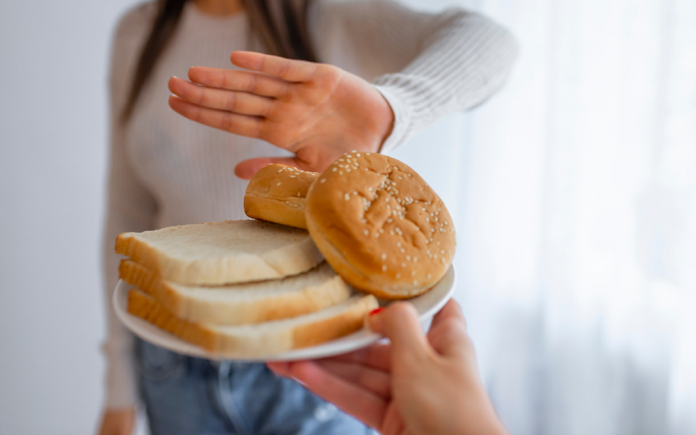
By Michelle Borthwick
Ever wonder why carbs are so addictive? It has to do with chemicals that travel from the stomach to the part of the brain where you produce dopamine, a hormone and neurotransmitter that affects the brain’s pleasure and reward centers. Once these areas of the brain are stimulated, you’ll keep wanting more of the addictive substance, whether it’s alcohol, drugs or carbs.
Too many refined carbs are simply toxic for your body. They’re often responsible for visceral fat, the dangerous fat you can carry around your middle that inhibits your body’s ability to make insulin, which makes you more prone to diabetes. Carbs also increase your risk for cardiovascular disease and even cancer.
The building blocks of everything that is good in this world and that we crave is muffins, croissants, cakes, cookies, pies, tortilla chips, pizza, pasta, breads … all carbs. All amazing! It’s easy to be addicted. It’s everywhere.
So, we know most of this right. It’s becoming common knowledge that too many carbs do not really work for optimal health. So why is it so hard to lay off the carbs? Why aren’t more people cutting back on carbs? Well quite frankly it’s because carbohydrates are so addictive, and the cravings are real.
So, if we are carb addicted is the decision to swap out the daily breakfast bagel with some eggs and avocado easier said than done, due to the incredibly potent addictive cravings like those of an alcoholic or a drug addict? The answer is yes!
So, here’s a new perspective. We often associate overeating with a simple lack of discipline. Why can’t someone just eat less carbs—as if it were that simple? Would you put an alcoholic in a room full of booze and then judge them harshly for opening a bottle? There is an understanding that some addictions are difficult to break and require more than just willpower alone. Are carb cravings any different?
It’s complicated. Overeating carbs is much less dangerous in the short term (but definitely not in the long term) than some other addictive vices. We’ve all had major carb benders and survived. The problem with refined sugars and carbs is that every single eatery or supermarket is basically the Vegas of sugar. How do you realistically avoid a temptation that is seemingly everywhere? You can’t avoid it. We live in a carb-laden world.
So, do we throw our hands up in the air and give in to carb cravings? I wouldn’t recommend it.
There are Solutions… Start Paying Attention to Carbs.
- Start taking a realistic look at your carb consumption so you have an idea how many carbs a day you are eating. Track your carbs there are many great apps for this. Then step it down until you reach about 75 grams of carbs a day with a final goal to 50. (The average American has between 200-300 grams of carbs per day or more). The scale will start going in the right direction and that puffy feeling will go away just by cutting carbs. It’s that simple.
- You also want to keep in mind that all carbs are not the same. You may not want to avoid carbs altogether but at least avoid anything that is heavily processed. Refined carbs will be far more addictive, as they cause higher spikes and corresponding steeper drops in blood sugar and are less nutrient dense—two key factors that make food more addictive. Get your carbs from veggies and nutrient dense foods.
- For those of you reading this… it can stop NOW. We all have a limit where we know we are done!
- Remove artificial sweeteners and sugar: Remove aspartame, maltodextrin, dextrose or sucralose. These are common in low-carb or diet foods. They react in our body the same as sugar and contribute to our weight gain. Start using sweeteners that don’t raise your glycemic index such as monk fruit, stevia and erythritol.
- Read Labels: Start reading all your labels to look for hidden sugars and carb count.
- Stop the mindless eating: I challenge you to identify your mindless and stress eating that is contributing to your weight gain and adding in too many carbs.
- Have patience with yourself. We didn’t get where we are overnight, and it takes time to make changes. Enjoy the process (both the setbacks and the successes) and celebrate every step in the direction of your commitment to cutting carbs.
- Make sure you are getting enough sleep. Studies show that increased sleep helps decrease the levels of ghrelin in your body, which is the hormone responsible for making you feel hungry and crave those yummy carbs for increased energy.
You may also want to give Keto a try. While there isn’t a dietary approach that works for everyone, adopting a low carb/high fat, or Ketogenic, diet can help regulate hunger hormones (you won’t be hungry), you’ll have more energy, lose weight and the foods are delicious. If I can help you with Keto or a low-carb lifestyle and you’d like a free consult please book it on my web at ketoiseasycoach.com . We’ll talk about all things carbs, keto and I can help you make an action plan to start cutting carbs.
About Michelle:
Michelle Borthwick, known more widely as Michelle Keto, is the foremost expert in living the Keto lifestyle and the go-to coach for Keto women. She loves the CA lifestyle and spends time between San Diego and Palm Springs, CA. Her 1:1 coaching, and group programs have helped hundreds of women from 25 states and 4 countries lose over 7,500 pounds while eating foods they love. This foodie’s motto, and business name, is “Keto is Easy” and she’s one of the only Keto leaders who promotes full customization for long term success. For a complimentary 30-minute coaching call please schedule at: https://ketoiseasycoach.com/










































